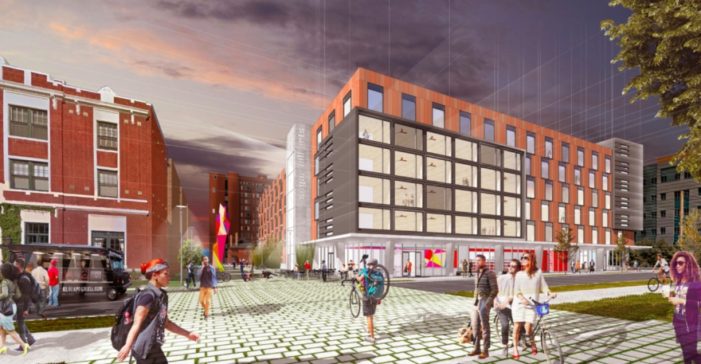Straight off of his widely lauded speech at the Mackinac Policy Conference in which he highlighted the need for affordable housing, Mayor Mike Duggan, Midtown Detroit representatives and local architects came together to announced a new housing project in the city with 25 percent affordable units.
On Friday, Mayor Duggan announced the developers and design team for a mixed-use, mixed-income project in the Sugar Hill Historic District in Midtown. The team includes internationally- recognized architect Phil Freelon, the man behind the design of the new National Museum of African American History and Culture in Washington D.C.
 The $32 million project will bring 84 new apartments to the nearly one acre of vacant space. More importantly to the city and the Mayor, 25 percent of the apartments will be set aside as affordable housing for those making between 50 to 80 percent of the area median income. Duggan and his staff have focused on created a city that has room for all income levels, and it is a theme he has repeated throughout his months in office.
The $32 million project will bring 84 new apartments to the nearly one acre of vacant space. More importantly to the city and the Mayor, 25 percent of the apartments will be set aside as affordable housing for those making between 50 to 80 percent of the area median income. Duggan and his staff have focused on created a city that has room for all income levels, and it is a theme he has repeated throughout his months in office.
The project will also include 7,000 square feet of commercial space, a nearly 300-space parking g Sarage for residents and the public, and green alleyways.
The development team will be led by Sonya Mays from locally-based Develop Detroit and Rodger Brown from Preservation of Affordable Housing Inc. The design team is led by Phil Freelon who is an appointee to the National Commission of Fine Arts and is also known for his work on the National Center for Civil Rights in Atlanta and the Museum of the African Diaspora in San Francisco. Freelon is teaming up with Michael Poris, of Detroit-based firm McIntosh Poris Associates. Poris is known for his work in preserving and revitalizing some of the city’s historic buildings like the Park Shelton, the former Detroit Fire Department Headquarters and the Garden and Madison Theatre buildings.
Sale of the land will go before City Council for approval later this year. The developer will purchase 0.79 acres of vacant land from the city for $400,000, pending council approval. The project is expected to break ground in September 2018.
“This development is part of our larger strategy for Detroit. This project will add affordable homes in the heart of Midtown, ensuring that Detroiters of all income levels can live anywhere in the city, even sought after areas like this,” said Mayor Duggan. “I’m proud of our partnership with this world-class team that has been chosen for this project.”
 The units of affordable housing in this project are part of more than 1,000 new affordable units in 20 projects spread out across the midtown and downtown areas.
The units of affordable housing in this project are part of more than 1,000 new affordable units in 20 projects spread out across the midtown and downtown areas.
“The City of Detroit has been an incredible partner in this process and our team looks forward to working together to create an inclusive community that reinforces the urban vitality of one of Detroit’s most historic neighborhoods,” said Sonya Mays, Develop Detroit CEO. “Plans for this project go beyond building high-quality, mixed income housing options for Detroiters. We will work hand-in-hand with residents and stakeholders within the existing community to ensure the development is an equitable one; one that creates a walkable environment anchored by commercial and retail spaces, pedestrian streets and alleyways, all of which are accessible to all and ensure continued investment in the arts and culture, education and wellness assets that already call the Sugar Hill district home.”
The approximately 84 new apartments are made up of studios and 1-2 bedroom apartments. 25% will be set aside for renters making between 50 percent of the area median income, around $26,000, to 80 percent of the area median income, around $40,000 a year.
The project will see the construction of the 102,200 square foot parking garage with approximately 300 spaces. Over 100 spots will be reserved for public parking. The remaining spots will be available monthly for residents of the development, retail visitors, and members of the neighborhood.
The construction of a new green alleyway and courtyard will also be included, and feature bike parking and open space for residents.
Photos courtesy of City of Detroit.


